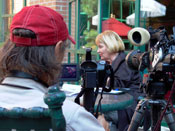|
At this year’s Toronto International Film Festival a large
variety of German productions and co-productions were featured.
We counted 35 films in many different categories. Echo Germanica
reviewed 3 of the most popular ones. All three films had a
Directors Talk segment afterwards at the Goethe Institute.
First we saw "Same Same But Different", a film directed by the
very successful Detlev Buck. The 47 year old has found a way to
mix up a style that pleases many different audiences and
satisfies industry standards with a successful mix that is not
too European esoteric, and definitely not Hollywood. It almost
feels like a new genre. "Same Same But Different" is based on a
true story, thus reflecting reality as it is: drastic at times,
with callous and sleazy elements, sex, drugs and love, the real
thing.
His work is like a good composition of music, it has different
movements, different paces, and different speeds, keeping a
certain amount of suspense in the story, because we cannot guess
what will come next.
Placed between Hamburg and a city in Cambodia, when young
Germans go to experience life without the eyes of family and
friends on them, much like the kids here go to Mexico for spring
break to live out their sexual fantasies. But not everyone is
like that and thus this incredible love story can take place
that is fraught with human dilemma between two cultures that are
as different as day and night. And in the end all is as well as
can be expected in this crazy world.
This is an unconventional story told in an unconventional way,
by a master storyteller, who is very interested in the human
condition, as we found out at a "Director’s Talk" in the Goethe
Institute after the first public screening.
| Director's Talk |
 |
| |
Detlev Buck |
 |
 |
| At the Goethe Institut
Toronto |
The Interview |
 |
 |
| The draw of the
ticket |
The second film we saw was "Soul Kitchen", which also is placed
in Hamburg at the docks, where Zinos runs a restaurant. Director
Fatih Akin is another younger, 36, German filmmaker who has
already enjoyed much success with his work. He brings an ethnic
flavour to the modern German Heimatfilm that makes this genre
interesting and exciting. The characters are vibrant and in
their diversity extremely interesting. A slice of real life, or
as it could be, made this a very entertaining film.
The third film we reviewed was "Phantomschmerz" – "Phantom
Pain", a first full feature effort of writer and Director
Matthias Emke. The story has an interesting German Canadian
connection.
The Canadian born son of a German-Canadian couple goes back to
Bremerhaven to find his father there, only to find out that he
did not miss much. He develops a love for cycling, at which he
is very good at, and had a relationship that produced a
daughter. To the disappointment of others he lives life to the
fullest, always looking for instant self-gratification without
any responsibilities. And then he has a near fatal accident in
which he loses a leg. This changes everything. Bit by bit, with
the help of others and especially a young woman who believes in
his talents as a writer, he accepts his fate, himself and the
world, finding confidence in himself and his abilities as a
cyclist and a writer, and he finds love.
This fine film found a well deserved spot as a gala at Roy
Thomson Hall and garnered much applause.
|
|



